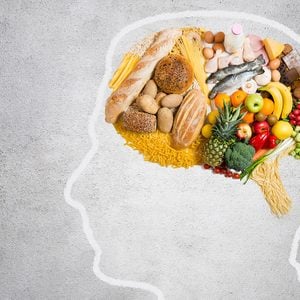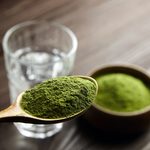If You’re Not Eating Avocado Every Day, This Might Convince You to Start
Packed with health benefits, avocado is an important part of a healthy diet. Here's the scoop on what makes this delicious, buttery Central American fruit good for more than just guacamole.
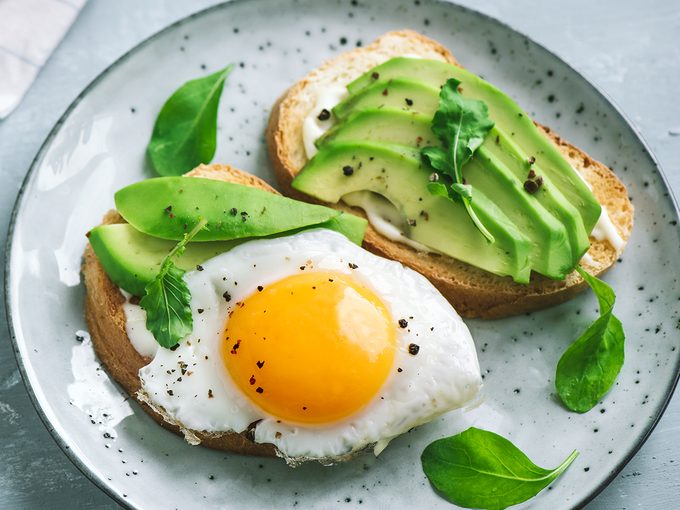
The benefits of avocado start with your heart
Like olive oil, avocado is rich in monounsaturated fat, which has been shown to reduce levels of bad cholesterol in your blood, lowering your risk for heart disease and stroke. In fact, when you replace saturated fats—that’s the bad kind found in butter, cheese, red meat and other animal-products—with monounsaturated fats in your diet, you can lower your levels of artery-clogging LDL cholesterol by up to 10 percent.
What’s more, avocado benefits your waistline by keeping belly fat at bay. One study found that participants who consumed a daily smoothie high in monounsaturated fats saw a reduction in visceral fat, the kind that surrounds your internal organs and is associated with a risk of metabolic syndrome, linked to heart disease, stroke and type 2 diabetes.
Find out how it’s actually possible to reverse heart disease.
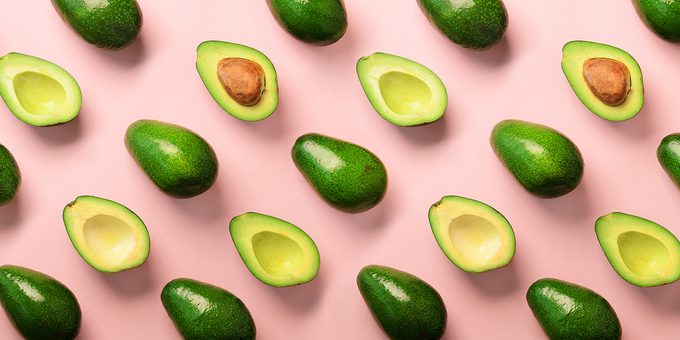
Avocado gets an “A” for absorption of vitamins
Avocado—which is classified by botanists as a fruit—pairs well with other fruits and vegetables in salads. Even better, it boosts their essential nutrients. “Because avocado is high in fat, it helps us absorb fat-soluble vitamins like A, D, K and E,” says Caroline Doucet, a registered dietitian in Kelowna, B.C.
Vitamin A in the form of beta-carotene (found in carrots and tomatoes) is essential for healthy vision, and can slow the progression of age-related eyesight decline. It also reduces your risk of bone fractures and supports a healthy immune system.
Vitamin D—which Health Canada recommends as a 400 IU daily supplement to all adults over 50—plays a significant role in regulating your body’s levels of calcium and phosphorus, which are essential for healthy bones and the prevention of osteoporosis.
Vitamin K is another bone-builder that is important for blot clotting, while Vitamin E is an antioxidant, scavenging those nasty free radicals that can damage cells and contribute to atherosclerosis, cancer and vision loss.
Here’s expert advice on how to maintain healthy eyes at every age.
An avocado a day could keep dementia at bay
Half an avocado contains 81 mcg of folate, also known as Vitamin B9, giving you roughly 20 percent of your daily requirement. Folate is important not only for red blood cell formation and chromosomal and DNA repair, but for cognitive health as we age. It blocks the buildup of a substance called homocysteine, which can slow the flow of nutrients to your brain, and there is evidence that a deficiency in folate contributes to depression, cognitive decline, Alzheimer’s and vascular dementia. (Learn how to spot the early signs of dementia.)
Folate, also found in dark green leafy vegetables and legumes, also helps prevent certain cancers.
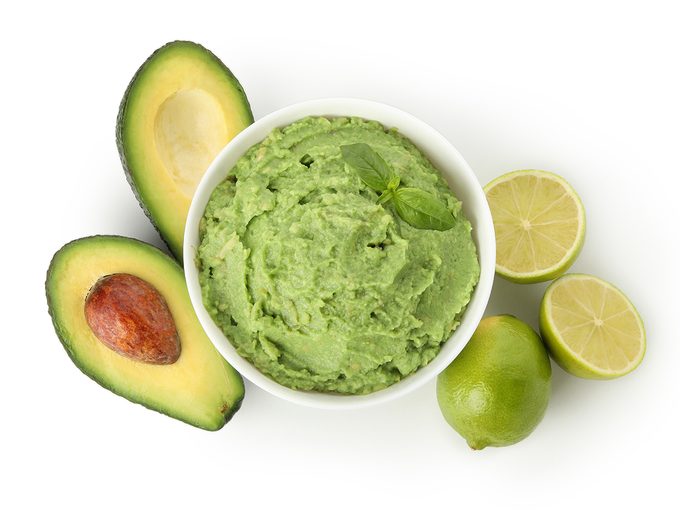
Avocado helps beat the mid-afternoon munchies
Avocado may get a bad rap for being high in calories—a whole one contains 322 of them—but a half is plenty satisfying for most people, says Doucet. What’s more, the benefits of avocado extend to weight loss, if that’s your goal. “Because it has healthy fat and lots of fibre, it increases satiety, which means you feel fuller, longer,” Doucet says. “If you don’t feel satisfied after a meal, that can increase cravings later on.”
A half ‘cado contains nearly 7 grams of fibre—already half your recommended daily intake. One study found that people who regularly consume avocado have a lower average body weight and body mass index (BMI) than those who don’t, despite no significant difference in calorie intake. “That may be because people who eat avocado most likely also eat more fruits and vegetables on the whole,” says Doucet.
It’s packed with potassium
Bananas may get all the glory for being rich in this essential mineral, but avocados are actually better in this respect. One half of an average avocado has 485 mg of potassium, compared to a medium-sized banana at 422 mg—which amounts to nearly 50 percent more potassium per gram of weight. Dice it and serve on top of your lunch salad, and you’ve covered 10 percent of your recommended daily intake.
Despite its importance as both a mineral and an electrolyte required for normal cell function, muscle contraction and nerve transmission, most Canadians aren’t getting enough potassium, according to Hypertension Canada. Low potassium and high sodium in your diet is linked to high blood pressure and heart disease—yet another reason to embrace avocado’s heart-healthy, vitamin and mineral-packed deliciousness.
Now that you know the benefits of avocado, find out the healthiest fish you can eat.
